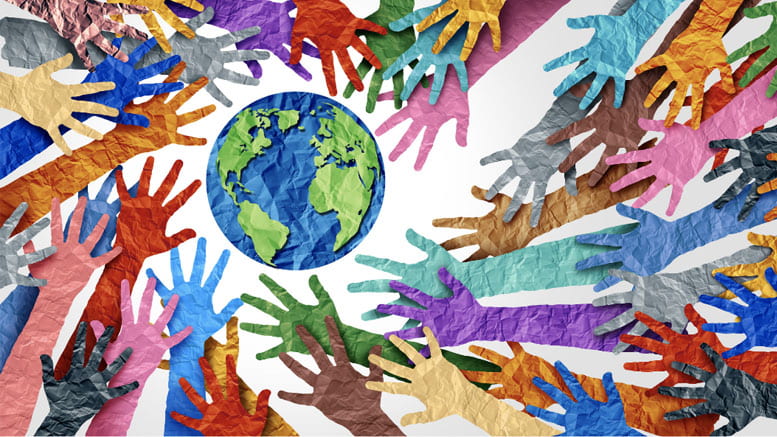How ‘diversity’ has evolved – and why we need to celebrate diversity now more than ever
April 28, 2022

Diversity isn’t what it used be.
According to Alvin Tillery, Jr., the founding director of Northwestern University’s Center for the Study of Diversity and Democracy (CSDD), “diversity” has become increasingly complex, nuanced, broader, and more contested.
Over the last five decades, diversity, a term initially sprouting from the American Civil Rights movement and applied in the context of racial inequalities, has morphed and expanded to encompass accelerating immigration streams from Latin America, Asia, and Africa as well as various religious identities, gender, and sexuality.
For Tillery, an associate professor in Weinberg College’s Department of Political Science and an oft-cited voice on diversity, equity, and inclusion (DEI) issues, the term’s expansion represents a positive development that positions the United States to lead as one of the globe’s most inclusive democracies.
“Exploring different cultures and adopting a more cosmopolitan stance allows us to grow as people while interacting with people different than us,” Tillery says.
A movement to celebrate diversity
In 2005, two prominent diversity companies, Minneapolis-based ProGroup, Inc. and Washington, DC-based Diversity Best Practices, created a proclamation to establish Celebrate Diversity Month as an official History and Heritage Month. While Congress had approved six such nationally designated History and Heritage Months at the time, ProGroup and Diversity Best Practices executives thought it valuable to have a defined period recognizing the nation’s diversity to heighten awareness and bridge differences. Celebrate Diversity Month is now an April fixture in workplaces, communities, and educational institutions across the U.S.
Tillery calls a month devoted to celebrating diversity in American life especially important in contemporary times as a segment of the U.S. population expresses not only its discomfort with an increasingly diverse society but even stands “committed to turning back the clock.”
“If we don’t make public displays of how we value each other and our differences, then it’s easy to fall back into telling narrow stories of who we are,” Tillery says.
And that, Tillery contends, threatens the very fabric of the nation’s democracy and hinders our collective advancement.
Earnestly embracing diversity
Through CCSD initiatives, which include regular surveys as well as leadership training around DEI, Tilley has discovered just how important diversity is to a healthy and well-functioning democracy. He sees corporate America more interested in DEI given assessment data underscoring the benefits of diverse workplaces and many young people “on board” with the diversification of American society, which spurs his optimistic outlook despite a still-polarizing climate.
“People are really malleable and we can grow in our perspectives,” Tillery says. “How we talk about these issues, especially in an era of misinformation, and how we work to understand the impact diversity can have on all of us is critical to creating a more tolerant society and progressing as a nation.”
Cultural diversity in collaboration, curriculum, and research
Several interdisciplinary units — centers, programs, and departments — at Northwestern’s Weinberg College teach, research, and build collaborations centered on culture and diversity. These units provide opportunities for faculty and students to investigate, understand, and share their learnings on a community, national, and global level.
For example, last year the Weinberg College Center for International and Area Studies (WCCIAS) launched the Global Lunchbox podcast that regularly includes faculty and other renowned experts that inspire dialogue on culture and diversity.
“WCCIAS reflects the idea that a world of diverse ideas and people should be reflected in the ideas and people of the College,” says Ian Hurd Director of the Weinberg College Center for International and Area Studies and Director of the International Studies Program.
“We aim to bring to campus perspectives from around the world and also to make it easier for students and faculty to reach out into the world. In both directions, we aspire to give the mic to new voices and provide a platform for new perspectives,” Hurd says.
New research on diversity is increasing as well. For instance, in the Department of Psychology, assistant professor Onnie Rogers researches the development of identities and intersectionality among children and adolescents in diverse cultural environments, as it relates to gender and race.
In her recent research, she discovered that children are fully aware of how views on race and racism have evolved and that it impacts their own identity development.
“We were surprised to see the clear and systematic changes in the content of children’s racial identities in relation to Black Lives Matter-related themes. It just became so clear that children were paying attention to how the broader conversation about race and racism had changed, and they were drawing on these social narratives to makes sense of their own racial identities,” explains Rogers.
Additionally, many faculty have been recognized for their excellence and faculty service in diversity, equity, and inclusion. For example, Myrna García, assistant professor of instruction in Latina and Latino Studies, received the Daniel Linzer Award for Faculty Excellence in Diversity and Equity for her advocacy.
Learn about more Weinberg College units below that are inspiring engagement, conducting research, and creating enriching opportunities for students in cultural studies and diversity:
American Studies
The American Studies Program draws on a broad range of faculty from the humanities and social sciences. Students examine components of U.S. culture, the diverse experiences of Americans, and others affected by Americans locally, nationally, and globally.
Program in African Studies
Created in 1948, the program of African Studies at Northwestern University is the oldest recognized formal program of African Studies in the United States, and is committed to creating an academic practice that re-centers Africans, African American and other black communities in the scholarship and knowledge production of and from Africa.
Asian American Studies
The Asian American Studies Program explores the experiences of Asian Americans and examines globalization, international relations, the complexity of culture, and prepares the student to learn more about themselves and their relationship to a new global world order.
Center for the Study of Diversity and Democracy (CSDD)
The mission of the Center for the Study of Diversity and Democracy is to stimulate research, dialogue, and civic engagement about the relationship between diversity and democratic politics.
Council for Race and Ethnic Studies
The Council for Race and Ethnic Studies prioritizes the study of the United States in the historical context of its position in the Americas, and the contemporary cultures of this country in light of advances in the study of “race,” ethnicity, religion, gender, and sexuality.
Department of African American Studies
The Department of African American Studies explores commonalities/connections, and differences/debates, on how people organize communities, shape cultures, and navigate dominant racial power structures. Students engage in curriculum that follows the roots and routes of Black people and ideas about Black people across the world.
Department of Asian Languages and Cultures
The Department of Asian Languages and Cultures offers an education in the languages, cultures, and literatures of Asia. Students acquire linguistic and transcultural competence in one or more regions of Asia as a dynamic site of international cultural relations.
Department of French and Italian
The Department of French and Italian explores worlds new and old, novel ideas, and journey through an exceptionally diverse social and cultural landscape rich in literature, media, visual and performing arts, fashion and design, gastronomy, social and political thought, and economic vitality.
Department of History
The Department of History’s undergraduate major includes a concentration in global history in addition to concentrations in the U.S., Latin America, Europe, Asia, Africa, and the Middle East.
Department of Slavic Languages and Literatures
The Department of Slavic Languages and Literatures offers a range of courses in Russian, Polish, and Czech languages, literatures and cultures.
Department of Spanish and Portuguese
The Department of Spanish and Portuguese help students gain a thorough understanding of the languages, the literatures, and the cultures of the Spanish- and Portuguese-speaking worlds.
Gender and Sexuality Studies Program
The Gender and Sexuality Studies Program investigates multiple standpoints within the humanities and social sciences, with particular attention to how gender and sexuality intersect with race, class, ethnicity, national belonging, and transnational movement(s).
Israel Innovation Project
The Israel Innovation Project’s (IIP) mission is to advance Northwestern’s technological and scientific partnerships with Israeli institutions of higher learning through collaborative research, global educational initiatives, innovative business ventures, and public engagement.
Alice Kaplan Institute for the Humanities
The Alice Kaplan Institute for the Humanities promotes expansive, interdisciplinary discussion and debate. Serving as a crossroads, clearing house and testing ground, the Institute cultivates ideas that transform into cutting-edge research and dynamic courses.
Latin American and Caribbean Studies (LACS)
The Latin American and Caribbean Studies Program (LACS) supports a diverse community of faculty and graduate students whose research covers the culture, history, and politics of Latin America and the Caribbean. Students in the program can study language, politics, art, culture and religion.
Latina & Latino Studies Program
Latina and Latino Studies focuses on the historic and contemporary circumstances that shape Latina and Latino lives, spaces, subjectivities, and politics in the United States. It encompasses diverse communities and nationalities while offering critical attention to how Latinas and Latinos relate and connect to cultural or geographical origins across the Americas.
Middle East and North African Languages Program (MENA)
MENA is one of the most diverse regions with more than sixty languages being spoken throughout. The four most common languages are Arabic, Persian, Hebrew and Turkish, are taught in the program. Students in the MENA Languages Program acquire skills and an in-depth perspective on the cultures and people of the MENA region.
Middle East and North African Studies Program
The MENA Program includes disciplines from anthropology, art history, classics, comparative literature, ethnomusicology, history, performance studies, political science, and religious studies — with attentiveness to the diverse populations that make up the MENA region and its diaspora.
Russian, Eurasian, and East European Studies (REEES) Research Program
The Russian, Eurasian, and East European Studies (REEES) Research Program brings together faculty and students bound by a shared interest in the vast region between Prague and Vladivostok, and supports research, teaching, and outreach by organizing speaker series, workshops, and conferences.
The Center for Native American and Indigenous Research
The Center for Native American and Indigenous Research is Northwestern University’s primary institutional space dedicated to advancing scholarship, teaching, learning, and artistic or cultural practices related to Native American and Indigenous communities, priorities, histories, and lifeways.
Weinberg College Center for International and Area Studies (WCCIAS)
The WCCIAS provides a unified administrative center for interdisciplinary teaching, research, and programs on international and regional issues. It is composed of three undergraduate majors and minors programs and an ensemble of faculty-led research groups.
Faculty

Joel Mokyr wins Nobel Prize in Economic Sciences
October 13, 2025
Nobel recognizes Mokyr’s theory on sustained economic growth Joel Mokyr, the Robert H. Strotz Professor of Arts and Sciences and professor of economics and history in the Weinberg College of Arts and Sciences at Northwestern University, today (Oct….

Northwestern accelerates quantum research with NVIDIA technology
September 19, 2025
NVIDIA code could help researchers tackle computationally demanding tasks hindering quantum research Northwestern University physicists are using NVIDIA technology to tackle the computationally demanding tasks hindering quantum research. Northwestern theoretical physicist Jens Koch and his research group…

Weinberg College welcomes new faculty members for 2025-2026 academic year
September 18, 2025
Shreeya Behera Assistant Professor of Instruction PhD institution: The Ohio State University Previous title and institution: Data Scientist at Pandora Bio, Inc. Home department: Statistics and Data Science Shreeya Behera is a mathematician and data…

Weinberg College faculty and graduate students recognized for excellence in teaching
July 2, 2025
Each year, the Weinberg College of Arts and Sciences and the Office of the Provost recognizes members of the College’s tenure-line and teaching-track faculty for excellence in teaching. Weinberg College in addition recognizes the contributions…



